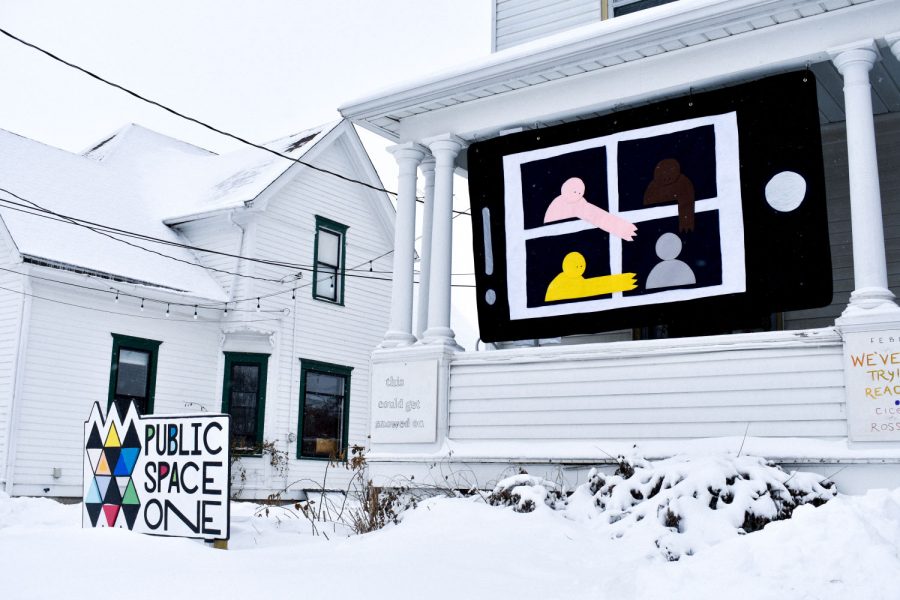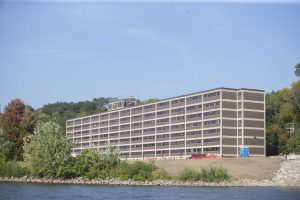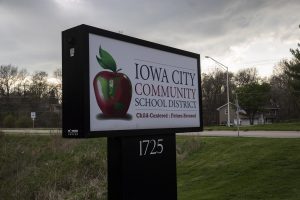Center for Afrofuturist Studies strives to uplift Black voices across various platforms
While racial tension and a call for more diversity, equity, and inclusion efforts have been at the forefront of society since the summer, the center is currently working on the Oracles of Iowa City Project and open submission calls for artists.
Public Space One, home of the Center for Afrofuturist Studies, is seen on February 7, 2021. All programming has moved online due to the COVID-19 pandemic. Currently, there are four artists in residence: Antoine Williams, Donté Hayes, Deborah Goffe, and André M. Zachery.
February 14, 2021
As the Center for Afrofuturist Studies approaches its fifth anniversary, the artist residency program at Public Space One is continuing to focus on projects that center and uplift marginalized voices, through an open submission call and Oracles of Iowa City Mural installation process.
Education coordinator for the Center for Afrofuturist Studies Dellyssa Edinboro said the program has become much more than an art residency.
“An important part of the CAS is how we can create a space where education about the arts can flourish about Black artists in particular,” Edinboro said.
The term “Afrofuturism” is central to the Center for Afrofuturist Studies, Edinboro said.
“Envision Black people in the future and envision how that connects with science and technology and new discoveries,” Edinboro said. “But also, how elements of the past within the Black community started in [shaping] the future, community, self-determination, [and] working towards a goal.”
There are a lot of definitions for what Afrofuturism means, Edinboro said, but the center also understands the flexibility with the term and encourages different artists to explore their own perspectives on the term.
John Engelbrecht, director of Public Space One, an Iowa City community art center, said the residency program for artists of color in Iowa City has acquired a physical location within Public Space One over the years.
He said the center has developed a variety of new programs that are now operating virtually.
“We pride ourselves on being resilient,” Engelbrecht said. “And the pandemic has proven that.”
Residencies usually last for a long time, Engelbrecht said, and the Center for Afrofuturist Studies bring some of its residents to Iowa City in the summertime and experience it in person.
Engelbrecht said the Center for Afrofuturist Studies is what Public Space One is most known for outside of Iowa City because it brings in artists from all over the country.
“So, we’re based here in Iowa City, we’re here to promote the future of Black people — an equitable future for Black people — and doing this in Iowa is both a challenge and also much needed,” Engelbrecht said.
Because Iowa is such a homogenized state, Engelbrecht said the impact the center can have in Iowa City may be a lot greater than in other places like New York City.
“It’s really about a daily positive imagining Black people in all aspects of the future,” Engelbrecht said.
The center is taking on the City of Iowa City Mural dedicated to Black future and support, the Oracles of Iowa City project, which is in its community feedback stage right now, Engelbrecht said. The center has two artists working on the plan created by the City of Iowa City as a local response to the George Floyd murder.
“The CAS wanted to take on this project because we are definitely for vibrant visual support of Black futures,” Engelbrecht said. “But we also wanted to be part of a process that was more than just a mural.”
Nichole Shaw, UI senior and writing fellow with Public Space One and the Center for Afrofuturist Studies, joined the team in November to document the Oracles of the Iowa City project as it comes to fruition this year.
Shaw said she and the center’s team are working to ensure as much transparency as possible.
Editor’s Note: Nichole Shaw is a previous Daily Iowan employee and current board member of Student Publications, Incorporated.
“There is an awareness that we need to be open-minded, very inclusive, and we have a responsibility to the public and making sure that when we reach out, we’re not doing things that are super performative,” Shaw said.
The center also helps students and faculty through engagement and philanthropy and creating opportunities for people that aren’t already in positions of power. While the UI has recently made efforts to meet DEI goals, Shaw said, the center has been doing that work for years.
Shaw said the Oracles mural is meant to be for the community and a receptive process, which has included reaching out to community leaders and creating a response survey for the first phase of the mural project, which will appear on the parking garage pillars across from the Voxman music building.
“This is something that we’re trying to do to uplift the Black community to support them to make them feel seen and heard,” Shaw said. “And, also something that we’re trying to do to make sure that we’re holding the community accountable, not the Black community — we’re holding the community at large accountable for their actions and the history that they’ve had.”





